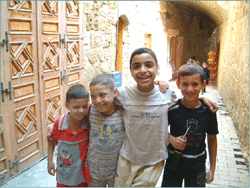| |
 |
 |
|
 |
 |
|
 |
 |
|
 |
| Growing Up In Cities (GUIC) |
 |
| Growing Up in Cities is a global effort to understand and respond to these and other questions, and to help address the issues affecting urban children and youth. |
 |
 It is a collaborative undertaking of the MOST Programme of UNESCO and interdisciplinary teams of municipal officials, urban professionals, and child advocates around the world, working with young people themselves to create communities that are better places in which to grow up-and therefore, better places for us all. It is a collaborative undertaking of the MOST Programme of UNESCO and interdisciplinary teams of municipal officials, urban professionals, and child advocates around the world, working with young people themselves to create communities that are better places in which to grow up-and therefore, better places for us all.
Project's website
Enlisting the Creativity and Energy of Children and Youth
Growing Up in Cities enlists the energy, ideas, and hope of young people to evaluate their own circumstances, define priorities, and create change. It also enables municipal governments and child advocates to implement the participation principles of the Habitat Agenda, Agenda 21, and the Convention on the Rights of the Child. It provides models of interdisciplinary, intersectoral collaboration for listening to the voices of young people and creating more responsive urban policies and practices.
Policies
Linking the Global and the Local
In the past decade, world leaders have made strong statements in support of young people’s participation in improving their environment:
According to the Preamble to the Habitat Agenda, which affirms the commitment of world governments to create more sustainable human settlements, “Special attention needs to be paid to the participatory processes dealing with the shaping of cities, towns and neighborhoods; this is in order to secure the living conditions of children and of youth and to make use of their insight, creativity and thoughts on the environment.”
According to Agenda 21 of the Earth Summit, children and youth are a major group who must be involved in participatory processes to create more people-friendly, sustainable environments.
According to the Convention on the Rights of the Child, young people under 18 are entitled to express their views in all matters that concern them - a principle that entails that young people have a right to receive and impart information and ideas.
Growing Up in Cities is an effort to link these lofty yet essential global initiatives and policy statements to local processes and actions. It believes that meaningful change must start at the local level, and that the process of making change is as important as the product of that change.
Investing in the Future
Young people must be active participants in evaluating their communities, in determining priorities for change, and in helping make change happen. In the process, they not only improve the quality of their communities, but develop greater awareness of the world around them, greater appreciation of their own value and capabilities, and invaluable experience in being constructive, contributing members of their communities.
Growing Up in Cities promotes education for action. It provides opportunities for young people to learn life skills and gain self-confidence through engagement in improving the public places of their local area: the same places where they will need to demonstrate social and environmental responsibility and the capacity for democratic action when they become adults.
------------------------------------------
Contact:
Nadia Auriat
n.auriat@unesco.org
Image: Saida, Lebanon © P. Rich |
|
|
|
| Start Date
|
16-01-1995
|
| End Date
|
31-12-2005
|
|
|
|
|
|
|
|
|
|
|
|
|
|
|
|
| Lead Organization / Sector / Office
|
UNESCO MOST Programme
|
|
|
|
|
|
|
| Associated Organization(s)
|
Childwatch International; The Norwegian Centre for Child Research
|
| Website (URL) |
|
|
|
|
|
 |
 |
 Email this page Email this page  Printable version Printable version
|
 |
|
|


